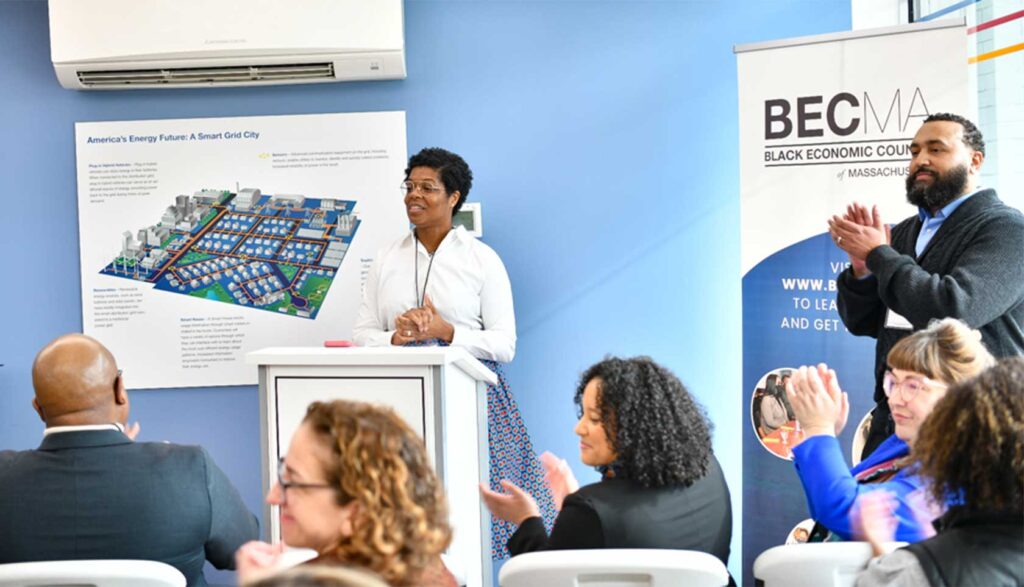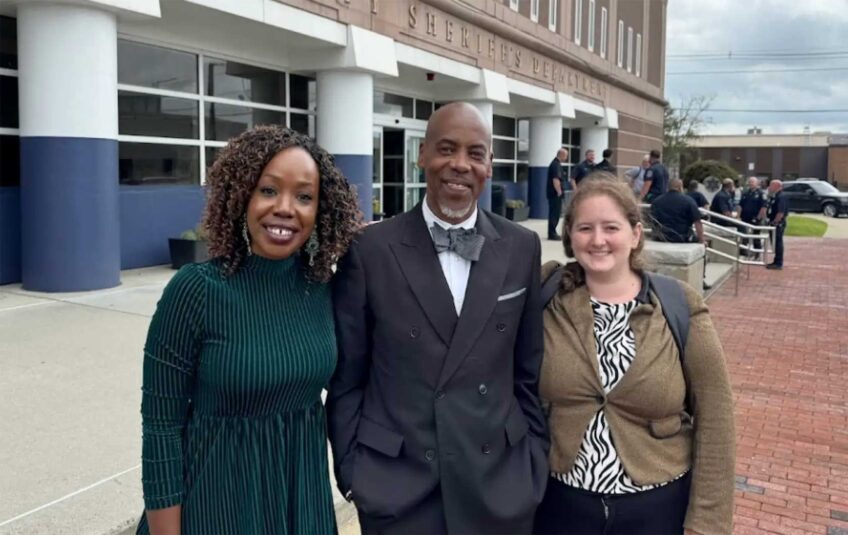
New grants from the Massachusetts state government aim to lower barriers for underserved and underrepresented populations entering clean energy careers and businesses.
The grants, announced Aug. 29, dedicate over $18 million to 44 organizations to help train workers in clean energy, grow offshore wind capabilities and offer specific supports for minority- and women-owned businesses. The Massachusetts Clean Energy Center (MassCEC), a quasi-public agency focused on economic development in the industry, provides the grants.
Nicole Obi, president of the Black Economic Council of Massachusetts (BECMA), which received one of the grants, called them an important opportunity for communities of color to participate in clean energy development and ensure they aren’t left behind, environmentally or economically.
“Many of Massachusetts-based Black-owned businesses, we missed the dot-com boom, life sciences, a lot of the construction, cannabis,” Obi said. “Climate and sustainability is the boom that we at BECMA really want to make sure that we are supporting our businesses in being a part of that wave, but also because we know that it’s incredibly important from an environmental perspective.”
That focus on diversity could allow for increased innovation in the field, said Nikhil Satyala, executive director of Benjamin Franklin Cummings Institute of Technology’s Center for Energy Efficiency and the Trades, another grant recipient.
“Across the tech industry, it is commonly known that in order for an industry to thrive successfully, it is essential to have an innovative and skilled workforce,” Satyala said “That includes people from all groups, all regions and from all kinds of backgrounds.”
Focusing on equity when it comes to communities of color also allows residents to tackle issues that may impact their communities at a disproportionate level, said Sidney Brown, head of school at Madison Park Technical Vocational High School — which also received a MassCEC grant. For example, Roxbury, Dorchester and Mattapan experience significantly hotter temperatures and more heat island effects.
Like the communities they aim to support, the different grants are diverse in scope and goals, but in multiple instances they’re working to grow existing programs and help organizations continue the work they’re already doing.
BECMA’s more than $650,000 grant will be used to support work it has been doing since 2021, when staff identified a growing need for companies to handle work with electric vehicle chargers in light of state and federal mandates pushing conversion to electric vehicles.
“Our businesses should be positioned to be big players in that space,” Obi said.
In the years since, BECMA has supported more than 100 Black business owners through its electric vehicle kickstarter events. The new grant money will allow BECMA to shepherd 20 more Black-owned firms in the state into the industry in two cohorts of 10.
At Franklin Cummings Tech, the grant will allow the college to continue with existing programming run out of its Center for Energy Efficiency and the Trades. Satyala said the grant also will allow the Center to expand its recruiting of students, from younger people to underemployed adults.
That growth is important as the state looks ahead to more jobs in the clean energy industry, he said. In a report released in July, MassCEC forecasted that to reach the state’s goals of a 50% reduction in carbon emissions by 2030 — and later net zero emissions by 2050 — the state will need to grow its clean energy workforce by more than 38,000 jobs, an increase of about 37%, over the next seven years.
“As an institution that primarily focuses on bridging the gap between the workforce and the needs of the industry, we always try to make sure that our curriculum is aligned with what the industry needs,” Satyala said. “This is the right moment for us to actually step in and step up.”
At Madison Park High, a clean energy workforce grant will go toward supporting and improving existing programs. Brown said it will extend the school’s computer science and facilities programs to support understanding of environmental impact and opportunities in those fields.
For Brown, it’s a push for better access to grants that he believes will offer students more opportunities in new fields. Prior to his start in 2021, the school had no grant manager, he said.
“It was important to bring somebody in to manage the grants that we had and also to go out and seek out new avenues of innovation so that our students can be involved in on the cutting-edge of improving their communities,” Brown said.
While BECMA is focused specifically on electric vehicles, Obi said a lot of the concepts they’re working on can be applied to other areas like offshore wind and solar energy.
“We just need all hands on deck to make sure that we’re actually able to reach our goals and we’re not going to get there leaving behind Black and brown businesses,” Obi said. “We need to get everybody that we can in the workforce to have the skills that we need in order to win this fight against climate change.”







